Mathematics Research Communities - 2023
The American Mathematical Society's Mathematics Research Communities is a professional development program for early-career mathematicians in which the participants develop collaborative research skills, build a network focused in an active research domain, and receive mentoring from leaders in that area.
MRC 2023 Informational Webinar
Check out the 2023 Webinar, where attendees interacted with organizers from the four 2023 summer workshops. The webinar included guidance about how to apply and about the entire MRC experience.
 About the Program
About the Program
Supported by NSF, the AMS, and other sources, the 2023 program includes:
- Intensive one-week, hands-on summer research conferences for each topic
- Guidance in career building
- Special Sessions at the Joint Mathematics Meetings (JMM) in January 2024
- Opportunities for follow-up small-group collaborations
- Longer-term opportunities for collaboration and community building among the participants
Over time, each participant is expected to provide feedback regarding career development and the impact of the MRC program through participation in a longitudinal study.
For each NSF-supported participant, the MRC program provides support for travel to the summer conference site and all accommodations and meals there, support for travel to the 2024 JMM, and opportunities for support in follow-up collaboration travel during the year following the summer conferences. See below for details.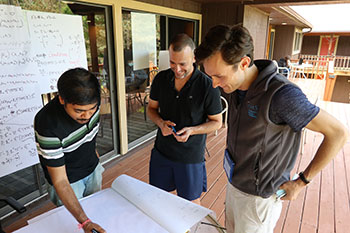
2023 MRC Summer Conferences
The summer conferences are typically hosted in June at a retreat-style site that is conducive to participant interactions and provides opportunities to enjoy the outdoors. To this point in time, MRCs have been hosted in such locations as Snowbird, Utah and West Greenwich, Rhode Island. See 2023 location information below.
The topics for the four anticipated MRC conferences are listed here. Applications will be accepted until February 15, 2023.
Week 1, May 28 – June 3, 2023: Ricci Curvatures of Graphs and Applications to Data Science
Organizers: Fan Chung, University of California, San Diego; Mark Kempton, Brigham Young University; Wuchen Li, University of South Carolina; Linyuan Lu, University of South Carolina; Zhiyu Wang, Georgia Institute of Technology
Week 2a, June 4 -10, 2023: Explicit Computations with Stacks
Organizers: Andrew Kobin, Emory University; Soumya Sankar, The Ohio State University; Libby Taylor, Center for Computing Science; John Voight, Dartmouth College; David Zureick-Brown, Emory University
Week 2b, June 4 -10, 2023: Derived Categories, Arithmetic and Geometry
Organizers: Matthew Ballard, University of South Carolina; Katrina Honigs, Simon Fraser University; Daniel Krashen, University of Pennsylvania; Alicia Lamarche, University of Utah; Emanuele Macrì, Université Paris-Saclay
Week 3, June 18 – 24, 2023: Complex Social Systems
Organizers: Heather Zinn Brooks, Harvey Mudd College; Daniel Cooney, University of Pennsylvania; Michelle Feng, California Institute of Technology; Mason A. Porter, University of California, Los Angeles; Alexandria Volkening, Purdue University
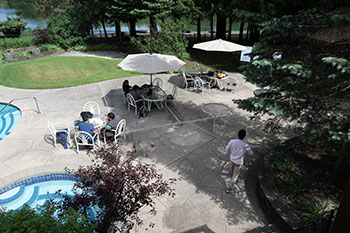
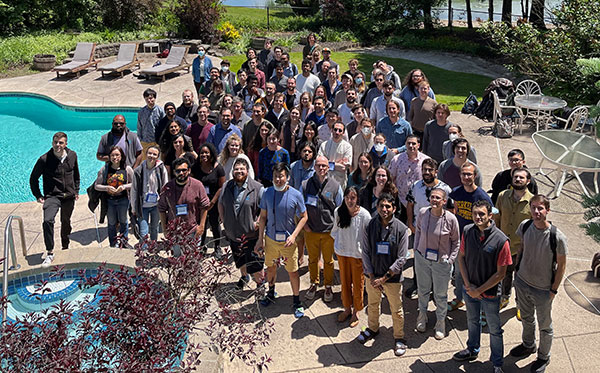
JMM Special Sessions
The program of the 2024 Joint Mathematics Meetings in San Francisco, CA, will include MRC Special Sessions on each of the 2023 summer conference topics. These and other activities at the national meeting provide opportunities for the participants to deepen connections with their topic, engage with their collaborative research peers and mentors, and cultivate their professional network. The MRC program provides support for participants to travel to JMM.
Follow-up Collaborations
Through the NSF grant and the AMS, a limited number of grants are typically available to support small-group collaboration travel during the year following the summer conference. The objective is to foster a continuation or completion of work begun at the conference site.
Application Process
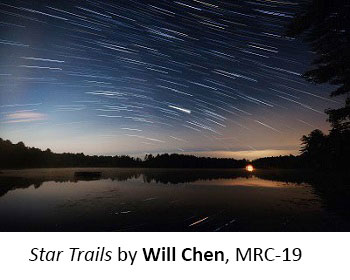 Applicants should be ready to engage in collaborative research and should be “early career”—either expecting to earn a PhD within two years or having completed a PhD within five years of the date of the summer conference. Exceptions to this limit on the career stage of an applicant may be made on a case-by-case basis. The MRC program is open to individuals who are US citizens as well as to those who are affiliated with US institutions and companies/organizations. A few international participants may be accepted. Depending on space and other factors, a small number of self-funded participants may be admitted. Individuals who have once previously been an MRC participant will be considered for admission, and their applications must include a rationale for repeating. Please note that applications from individuals who have twice been MRC participants will not be considered.
Applicants should be ready to engage in collaborative research and should be “early career”—either expecting to earn a PhD within two years or having completed a PhD within five years of the date of the summer conference. Exceptions to this limit on the career stage of an applicant may be made on a case-by-case basis. The MRC program is open to individuals who are US citizens as well as to those who are affiliated with US institutions and companies/organizations. A few international participants may be accepted. Depending on space and other factors, a small number of self-funded participants may be admitted. Individuals who have once previously been an MRC participant will be considered for admission, and their applications must include a rationale for repeating. Please note that applications from individuals who have twice been MRC participants will not be considered.
We seek individuals who will both contribute to and benefit from the MRC experience, and our goal is to create a collaborative research community that is vibrant, productive, as well as diverse. The AMS recognizes the breadth of people, thought, and experience that contribute to mathematics. We value the contributions of all members of our mathematics community to improve mathematics research, education, and the standing of the mathematical sciences. We welcome everyone interested in mathematics as we work to build a community that is diverse, respectful, accessible, and inclusive. We welcome applicants from academic institutions of all types, as well as from the business, entrepreneurial, government labs and agencies, industry, and non-profit (BEGIN) arena. Women and under-represented minorities are especially encouraged to apply.
The application deadline has now passed and no new applications are being accepted.
All participants are expected to be active in the full array of MRC activities—the summer conference, special sessions at the Joint Mathematics Meetings, and follow-up collaborations.
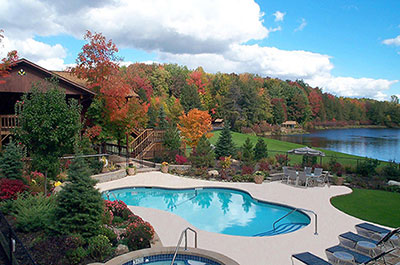 Location
Location
The 2023 summer conferences of the MRC will be held at Beaver Hollow Conference Center, Java Center, NY, where participants can enjoy a private, distraction-free environment, conducive to research. Beaver Hollow is located in Western New York, 45 minutes from the Buffalo Niagara International Airport, one hour from Rochester or Niagara Falls. This property offers over 200 acres of lakes and scenic woodlands with state-of-the-art meeting facilities, comfortable guest rooms, and nutritious and creative cuisine using organic, locally grown farm-to-table ingredients. Participants will have access to an abundant range of recreational opportunities, and at the conclusion of the day’s program, informal discussions of the day’s sessions may continue while relaxing by a lakeside campfire.
Well-Being Protocols
Due to the ending of the COVID-19 Public Health Emergency Declaration, as of May 11, 2023, COVID-related protocols are no longer in place for this conference.
- Participants, including staff and volunteers, are no longer requested to be vaccinated or tested.
- Wearing a mask is optional and will be based on individual comfort levels. Extra masks will be available at the registration desk, while quantities last.
- If anyone has been exposed to COVID-19 within 72 hours of coming to the meeting, they should wear a mask throughout the meeting.
- If anyone tested positive for COVID-19 within 72 hours before coming to the meeting, they should not come to the meeting.
- If anyone tests positive for COVID-19 during the meeting, they should isolate in their room from others for the remainder of the program.
The AMS is committed to the well-being of all participants at these conferences and will continue to share any updates.
Special Needs
It is the goal of the AMS to ensure that its conferences are accessible to all, regardless of disability. The AMS will strive to make all as accessible as possible.
If special needs accommodations are necessary in order for you to participate in a MRC Summer Conference, please communicate your needs in advance to your Meeting Specialist or by sending email to mmsb@ams.org.
AMS Policy on a Welcoming Environment
The AMS strives to ensure that participants in the MRC Summer Conferences enjoy a welcoming environment. In all its activities, the AMS seeks to foster an atmosphere that encourages the free expression and exchange of ideas. The AMS supports equality of opportunity and treatment for all participants, regardless of gender, gender identity or expression, race, color, national or ethnic origin, religion or religious belief, age, marital status, sexual orientation, disabilities, or veteran status.
Harassment is a form of misconduct that undermines the integrity of the AMS, and its activities and missions.
The AMS will make every effort to maintain an environment that is free of harassment, even though it does not control the behavior of third parties. A commitment to a welcoming environment is expected of all participants of AMS activities, including mathematicians, students, guests, staff, contractors and exhibitors, and participants in scientific sessions and social events. To this end, the AMS will include a statement concerning its expectations towards maintaining a welcoming environment in registration materials for the Sectional Meetings, and has put in place a mechanism for reporting violations. Violations may be reported confidentially and anonymously to 855-282-5703 or on the website. The reporting mechanism ensures the respect of privacy while alerting the AMS to the situation.
MathSafe
MathSafe is a program by and for the mathematical community to support safe and welcoming meetings. MathSafe volunteers will be available at the conference to listen to and guide participants who experience harassing behavior.
For assistance, come to the Registration Desk. To speak to an ombudsperson directly or for assistance when the desk is closed, call (401) 455-4040.
The AMS strives to ensure that participants in the meeting enjoy a welcoming environment. See the Welcoming Environment policy above. A mechanism for reporting violations confidentially and anonymously is included in this policy.
Code of Conduct
Disruptions: The American Mathematical Society (AMS) is committed to upholding the professional and educational purposes of its meetings and conferences. We affirm the right of registered attendees of AMS meetings and conferences to participate fully in all scheduled program activities and we aim to provide a safe and welcoming environment for everyone present. Any expressions of dissent must not inhibit conference activities, disrupt the full participation of registered attendees, nor pose a threat to the personal safety of others. If the AMS and meeting organizers determine that any event or action is disruptive or prohibited, they may remove those involved in the event or action from the meeting, revoke the registration of individuals involved, or take further appropriate actions, if deemed necessary.
Contact Information
For further information, please email MRC 2023.



 About the Program
About the Program


 Applicants should be ready to engage in collaborative research and should be “early career”—either expecting to earn a PhD within two years or having completed a PhD within five years of the date of the summer conference. Exceptions to this limit on the career stage of an applicant may be made on a case-by-case basis. The MRC program is open to individuals who are US citizens as well as to those who are affiliated with US institutions and companies/organizations. A few international participants may be accepted. Depending on space and other factors, a small number of self-funded participants may be admitted. Individuals who have once previously been an MRC participant will be considered for admission, and their applications must include a rationale for repeating. Please note that applications from individuals who have twice been MRC participants will not be considered.
Applicants should be ready to engage in collaborative research and should be “early career”—either expecting to earn a PhD within two years or having completed a PhD within five years of the date of the summer conference. Exceptions to this limit on the career stage of an applicant may be made on a case-by-case basis. The MRC program is open to individuals who are US citizens as well as to those who are affiliated with US institutions and companies/organizations. A few international participants may be accepted. Depending on space and other factors, a small number of self-funded participants may be admitted. Individuals who have once previously been an MRC participant will be considered for admission, and their applications must include a rationale for repeating. Please note that applications from individuals who have twice been MRC participants will not be considered. Location
Location